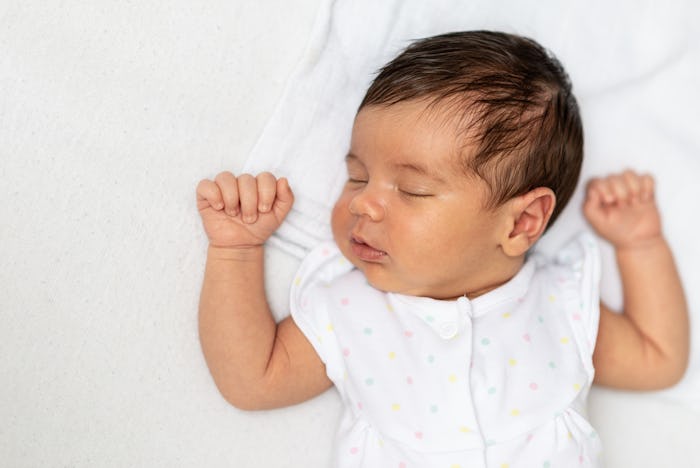Life

Experts Explain Why Babies Do That Weird Jumping Thing In Their Sleep
For sleep-deprived parents, there's nothing more frustrating than setting your baby gently down to sleep and watching as they suddenly jerk themselves awake. Why do babies jump in their sleep? And can this seemingly strange quirk of babyhood sabotage bedtime?
"These are called hypnic jerks and are a normal part of falling asleep," Lynelle Schneeberg, Psy.D., pediatric sleep psychologist and director of the Behavioral Sleep Program at Connecticut Children's Medical Center, tells Romper. "They just mean that your baby is relaxing their muscles into sleep."
Sometimes though, this action can be startling to parents as their baby appears to be jerking in a way that is unlike any other movement they've seen. "Babies have nervous systems that are immature," pediatrician Dr. Whitney Casares explains. "When they sleep, their movements can be even less synchronized than during awake periods."
I now vaguely remember my college psychology professor explaining how our bodies and minds react to the process of falling asleep, so it makes total sense that a baby would experience this same phenomenon. Dr. Schneeberg explains that your baby's experience is "similar to the way you might wake up sometimes just after falling asleep thinking that you are falling or have tripped. But, most of the time, we have hypnic jerks, too, and don't wake up."
But what about when a baby does wake up after you notice the jerking? Dr. Melissa Liggett, Ph.D., developmental psychologist at Children’s National Hospital, tells Romper that these instances are usually unrelated. "Typically this action does not disrupt a baby’s sleep," she says. "Unless there is another need that the baby has, such a hunger or discomfort from a wet diaper, than these movements shouldn’t independently disrupt a baby’s sleep."
This is great news for parents who may wonder whether or not their baby's sleep will be disrupted by their jerking or jumping movements. But when you see your baby's body hop to life like a tiny little jumping bean when they're fast asleep, it can be startling and bring on a rash of questions. Does it hurt? Does this mean they aren't sleeping well? Do I need to tell their pediatrician?
"Babies have more frequent periods of REM sleep, therefore tend to be more active naturally than adults are in their sleep," Dr. Liggett tells Romper. "Not only are their bodies active, but their brains are active as well, consolidating all of the information that a baby has taken in and learned in a day. So it can be developmentally advantageous for this kind of activity during sleep."
Although it might be startling, your baby's hypnic jerks aren't something that need to be stopped and you really don't need to do anything to try to prevent them from happening to your baby. If you do find that your baby is experiencing them often, Dr. Schneeberg says that "you can swaddle the baby if the baby is the right age to do so," and that it might help. But overall, there is really nothing you need or can do to address the issue other than just accept this normal part of sleep development.
Experts agree that while some amount of jumping or twitching is normal for babies, parents should feel comfortable discussing any issue they're concerned about with their pediatrician — specifically if there are additional problems like difficulty breathing, turning blue, or movement that only occurs on one side of the body, as these can be signs of seizure activity. Additionally, Dr. Casares tells Romper, "If a baby has continuous jerking movements while they're asleep or if they also have any sudden movements when they’re awake, parents should seek medical care."
Experts:
Dr. Whitney Casares, author of "The New Baby Blueprint: Caring for You and Your Little One" and host of "The Modern Mommy Doc Podcast"
Dr. Melissa Liggett, Ph.D., developmental psychologist at Children’s National Hospital
Lynelle Schneeberg, PsyD, pediatric sleep psychologist, author of Become Your Child’s Sleep Coach, and director of the Behavioral Sleep Program at Connecticut Children's Medical Center